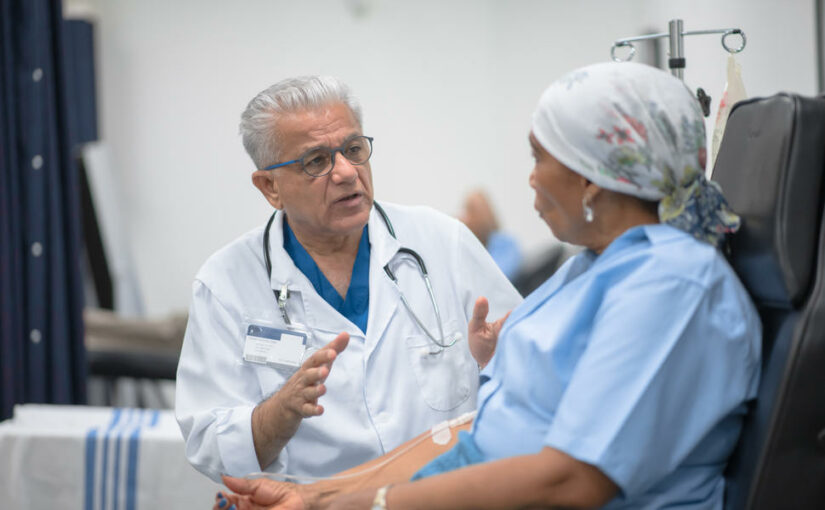By James H. Doroshow, M.D.
More than 8 years ago, NCI launched NCI-MATCH, a first-of-its-kind precision medicine cancer clinical trial. NCI-MATCH tested different targeted therapies in people with cancer whose tumors had specific genetic changes. This year, three second-generation precision medicine trials—ComboMATCH, MyeloMATCH, and iMATCH—are getting underway to build on the knowledge generated by NCI-MATCH and other NCI precision oncology initiatives.
James H. Doroshow, M.D., director of NCI’s Division of Cancer Treatment and Diagnosis, reflects on the accomplishments of NCI-MATCH and offers an overview of these three successor trials.
Starting in the mid-2000s, a series of small studies showed that sophisticated genomic analyses of a person’s cancer could identify those that were most likely to respond to targeted therapies. These findings stimulated NCI and other major cancer organizations around the world to pursue an ambitious idea: launching clinical trials in which patients were treated based on the molecular alterations in their tumors, regardless of the type of cancer they had.
Conducting such trials would not be simple. Among other challenges, it would require sequencing tumors from thousands of individuals with cancer and working with pharmaceutical companies to gain access to many targeted therapies for use in the trials.
But if we wanted to truly recognize the potential of precision oncology, these were challenges that had to be addressed.
The development of NCI-MATCH
So in 2015, after much planning, NCI launched a highly ambitious cancer precision medicine clinical trial, NCI-MATCH. The program involved collaboration across NCI’s two largest clinical trials programs, the National Clinical Trials Network and the NCI Community Oncology Research Program, and was managed by the NCI-supported ECOG-ACRIN Cancer Research Group.
The trial was open to patients with advanced solid tumors that had gotten worse after standard treatment, and to those with rare cancers for whom there was no standard treatment. NCI-MATCH was actually a series of small trials, or sub-studies, each evaluating a different targeted drug.
A critical component of NCI-MATCH was the genomic analysis of patient tumors. Tumor genomic testing is now routine for many cancer types, but at the time NCI-MATCH was being planned, such testing was investigational and was not covered by most insurers.
So there were numerous challenges to overcome related to genomic testing. They included:
- Standardizing the testing processes: This was critical to ensure that the results would be the same regardless of which laboratory analyzed the tumor biopsy samples.
- Ensuring that testing would be done on “fresh” tumor samples: Analyzing biopsies that have been subject to standard preservation techniques produces the most reliable results. Thus, we had to develop the infrastructure and processes for collecting tumor biopsies from patients and quickly sending them for testing.
- Including participants of different ethnic and socioeconomic backgrounds and from across the country: For this trial to provide truly meaningful results, participants had to be representative of patients being treated at community hospitals and large academic cancer centers alike.
Genomic testing for NCI-MATCH was originally performed by four centralized laboratories, but we were eventually able to establish a much larger, nationwide network of labs. This helped to speed up recruitment and enroll people with very rare mutations.
NCI-MATCH closed earlier in 2023, after 39 sub-studies had been completed. It’s important to note that, by design, each of these sub-studies was intended to be “signal finding.” In other words, we were not expecting that they would lead to immediate changes in patient care. Our goal, rather, was that the substudies could help identify promising drugs to be pursued in larger, more definitive clinical trials.
The findings from these substudies continue to be reported. Of the 15 substudies that have been reported to date, at least seven had high enough tumor response rates to be considered a positive finding, and one led to an accelerated FDA approval.
Moving to combinations with ComboMATCH
The results from NCI-MATCH suggest that using targeted therapies in combination should be the next important component of precision medicine. Combining therapies that work in different ways may help delay the development of tumors developing resistance to treatment.
More importantly, it can help address one of the biggest challenges to making advances in precision oncology: the phenomenon of tumor heterogeneity—that is, when distinct populations of cells in tumors are driven by different genomic alterations.
ComboMATCH launched this spring to test whether drug combinations—two targeted drugs, or a targeted drug plus a chemotherapy drug—can overcome the drug resistance that we’ve seen with single drugs.
We’ve taken a new approach with ComboMATCH, establishing an open competition among the research community to identify the combinations to be tested. And we’re requiring a substantially higher level of evidence to allow a drug combination to be included in ComboMATCH than was required for NCI-MATCH.
That evidence includes robust data from either animal studies or clinical trials showing that the combination of the two drugs has greater anticancer activity than either drug alone.
Although we set a high bar, the community has come forward with strong enough data for us to launch our initial batch of four trials. These are exciting studies, two of which are open to participants with any solid cancer and all of which are testing promising targeted therapies.
Now that these trials are enrolling participants, we have again started soliciting proposals that will form the basis of additional ComboMATCH studies.
Following the patient journey through MyeloMATCH
The second of the successor trials is MyeloMATCH. This study breaks from the mold of the “all-comers” approach to NCI-MATCH by only enrolling patients with acute myeloid leukemia (AML) and myelodysplastic syndromes (MDS). Both are historically difficult-to-treat diseases for which progress over the past few decades has been limited.
Most clinical trials include participants who have already undergone treatment for their cancer or who have advanced cancer. MyeloMATCH is unique in that it will offer participants the opportunity to enroll in a precision medicine trial from the time of their initial diagnosis and throughout the course of their disease.
This unique approach recognizes that both of these cancers require multiple phases of treatment, each designed to keep the disease in check for as long as possible.
Anyone with a new diagnosis of AML or MDS is eligible to enroll in MyeloMATCH. Those who join will have rapid genomic testing of blood and bone marrow samples to see if they have specific genetic alterations for which there are corresponding targeted therapies. Results from this testing will be available within 72 hours, instead of the typical 2 to 3 weeks.
Based on the molecular characteristics of their tumors, patients will be matched to an initial treatment trial, called a tier-one study, evaluating drugs targeting those specific biomarkers.
After patients have completed the initial trial, and if the treatment is working against the cancer, they will undergo further genomic testing. At this point, they will be assigned to second-, third-, or fourth-tier studies, each evaluating how effectively different treatments are at eliminating or controlling their cancer.
Investigating immunotherapies with immunoMATCH
It is no secret that immunotherapy is perhaps the most exciting new treatment option for some cancers. Our job now is to take the necessary steps to extend the promise of these treatments to even more people with cancer.
ImmunoMATCH, or iMATCH, is NCI’s first precision medicine trial focused on immunotherapy. We have begun ImmunoMATCH with a pilot study to look at the combination of two treatments that have different effects on how the immune system responds to tumors. One is nivolumab (Opdivo), which can help to recruit immune cells to attack tumors, and the other is cabozantinib (Cabometyx), which not only can kill cancer cells directly but also may help draw the immune system’s attention to tumors.
This pilot trial is recruiting patients with advanced melanoma or certain types of head and neck cancer that have stopped responding to existing treatments.
One of the study’s aims is to see if combining two drugs that work on the immune system in different ways is more effective than what’s been seen in earlier studies of either drug alone.
A larger goal of the pilot study, however, is more pragmatic and will help inform the next trials to be launched as part of ImmunoMATCH: standardizing the process of testing tumors for immune-related markers that may predict whether a tumor responds to immunotherapies. Without reliable and uniform testing, some patients won’t get potentially effective treatments and others may get an ineffective treatment.
ImmunoMATCH represents the first time testing will be done in a standardized way across a single, large trial involving participants from around the country.
Looking ahead to the next 10 years

As a community, we have learned a great deal about implementing precision medicine in everyday patient care and conducting precision oncology trials.
These next-generation trials build on the lessons from the past, incorporating the
knowledge we’ve gained and building in the flexibility needed to rapidly implement new ideas and take advantage of the latest improvements in technologies.
They also bring with them unprecedented levels of collaboration across the
research community, including NCI’s clinical trials groups, the pharmaceutical industry, academia, and regulatory bodies. Without these partnerships, these trials would never have gotten off the ground.
Most importantly, we must recognize the enormous contributions of participants in these trials. They are making it possible for future patients to have more effective, safe, and personalized treatments.
This article was published by: National Cancer Institute


